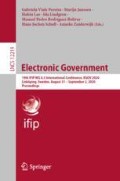Abstract
Measuring customer service quality evaluations has been important since the rise of the service industry and many models in this area have been published. Most models focus on one outcome with a set of predictors. These outcomes are often ill defined and concepts are used interchangeably causing issues in creating good and consistent measures of quality. In this study we develop a new model combining multiple outcome variables and a series of predictors to show the interdependent nature of service outcomes. We test the model using machine learning based on survey responses from 3702 Dutch people. The results indicate that two types of outcome variables are important; quality of the outcome and satisfaction with the process. Each is predicted in different ways by four dimensions. This means governments could benefit from a better specification of the desired outcomes of service delivery and targeted measurement approaches.
Access this chapter
Tax calculation will be finalised at checkout
Purchases are for personal use only
References
Parasuraman, A., Zeithaml, V.A., Berry, L.L.: SERQUAL a multiple-item scale for measuring consumer perceptions of service quality. J. Retail. 64, 12 (1988). https://doi.org/10.1016/S0148-2963(99)00084-3
Cronin, J.J., Taylor, S.A.: Measuring service quality: a reexamination and extension. J. Mark. (1992). https://doi.org/10.2307/1252296
Davis, F.D.: Perceived usefulness, perceived ease of use, and user acceptance of information technology. MIS Q. Manag. Inf. Syst. (1989). https://doi.org/10.2307/249008
Papadomichelaki, X., Mentzas, G.: e-GovQual: a multiple-item scale for assessing e-government service quality. Gov. Inf. Q. 29, 98–109 (2012). https://doi.org/10.1016/j.giq.2011.08.011
Alanezi, M., Kamil, A., Basri, S.: A proposed instrument dimensions for measuring e-government service quality. Int. J. u-and e-Serv. Sci. Technol. 3, 1–18 (2010)
Institute for Citizen-Centered Service: Citizen First 2018, Ontario (2018)
Research, I.: De kwaliteit van de overheidsdienstverlening 2015 (2016)
Donnelly, M., Dalrymple, J.F., Wisniewski, M., Curry, A.C.: The portability of the SERVQUAL scale to the public sector. In: Kanji, G.K. (ed.) Total Quality Management, pp. 271–274. Springer, Dordrecht (1995). https://doi.org/10.1007/978-94-011-0539-2_39
Shieff, D.: Service quality components and group criteria in local government. Int. J. Serv. Ind. Manag. (1993). https://doi.org/10.1108/09564239310044280
Melo, A.I., Goncalo, S., Lima, R.: Measuring the quality of health services using SERVQUAL: evidence from Portugal. In: Handbook of Research on Modernization and Accountability in Public Sector Management, pp. 300–3187. IGI Global (2018)
Setiajit, D.G., Utomo, A.: A servqual measurement of public service from motor vehicle taxation office (SAMSAT) in Indonesia. J. Karya Dosen ITN Malang, 76–82 (2017)
Ocampo, L., et al.: Public service quality evaluation with SERVQUAL and AHP-TOPSIS: a case of Philippine government agencies. Socioecon. Plann. Sci. 68, 10064 (2019)
van Deursen, A.J.A.M., Pieterson, W.: The Internet as a service channel in the public sector. In: ICA Conference, Dresden, Germany (2006)
Nguyen, M.H.: A study on evaluation of e-government service quality. Int. J. Soc. Manag. Econ. Bus. Eng. 8, 16–19 (2014)
Sang, S., Lee, J.D.: A conceptual model of e-Government acceptance in public sector. In: Proceedings of the 3rd International Conference on Digital Society, ICDS 2009 (2009). https://doi.org/10.1109/ICDS.2009.30
Parasuraman, A., Zeithaml, V.A., Malhotra, A.: E-S-QUAL a multiple-item scale for assessing electronic service quality. J. Serv. Res. (2005). https://doi.org/10.1177/1094670504271156
Madsen, C.Ø., Hofmann, S., Pieterson, W.: Channel choice complications. In: Lindgren, I., Janssen, M., Lee, H., Polini, A., Rodríguez Bolívar, M.P., Scholl, H.J., Tambouris, E. (eds.) EGOV 2019. LNCS, vol. 11685, pp. 139–151. Springer, Cham (2019). https://doi.org/10.1007/978-3-030-27325-5_11
Pieterson, W., Ebbers, W., Madsen, C.Ø.: New channels, new possibilities: a typology and classification of social robots and their role in multi-channel public service delivery. In: Janssen, M., et al. (eds.) EGOV 2017. LNCS, vol. 10428, pp. 47–59. Springer, Cham (2017). https://doi.org/10.1007/978-3-319-64677-0_5
Blaikie, N.: Approaches to Social Inquiry. Polity, Cambridge (2010)
Creswell, J.W.: Research Design. Qualitative, Quantitative, and Mixed Methods Approaches. SAGE, London (2014)
United Nations: E-Government Survey 2018 (2018). https://doi.org/10.18356/d54b9179-en. ISBN:978-92-1-055353-7
Brown, J.S., Collins, A., Duguid, P.: Situated cognition and the culture of learning. Educ. Res. (1989). https://doi.org/10.3102/0013189X018001032
Krueger, R.A., Casey, M.A.: Planning the Focus Group Study. In: Focus Groups a Practical Guide for Applied Research (2015)
Wold, S., Ruhe, A., Wold, H., Dunn III, W.J.: The collinearity problem in linear regression. The Partial Least Squares (PLS) approach to generalized inverses. SIAM J. Sci. Stat. Comput. (1984). https://doi.org/10.1137/0905052
Wetherill, G.B., Seber, G.A.F.: Linear regression analysis. J. R. Stat. Soc. Ser. A. (1977). https://doi.org/10.2307/2345290
Natekin, A., Knoll, A.: Gradient boosting machines, a tutorial. Front. Neurorobot. (2013). https://doi.org/10.3389/fnbot.2013.00021
Hastie, T., Tibshirani, R., Friedman, J.: Springer Series in Statistics (2009). https://doi.org/10.1007/b94608
Ebbers, W.E., Jansen, M.G.M., Pieterson, W.J., van de Wijngaert, L.A.L.: Facts and feelings: the role of rational and irrational factors in citizens’ channel choices. Gov. Inf. Q. 33, 506–515 (2016). https://doi.org/10.1016/j.giq.2016.06.001
Acknowledgement
We would like to thank the Ministry of the Interior for funding this work. The Ministry of the Interior had no role in the preparation of this publication.
Author information
Authors and Affiliations
Corresponding author
Editor information
Editors and Affiliations
Rights and permissions
Copyright information
© 2020 IFIP International Federation for Information Processing
About this paper
Cite this paper
Pieterson, W., Weng, C. (2020). Measure What Matters: A Dual Outcome Service Quality Model for Government Service Delivery. In: Viale Pereira, G., et al. Electronic Government. EGOV 2020. Lecture Notes in Computer Science(), vol 12219. Springer, Cham. https://doi.org/10.1007/978-3-030-57599-1_11
Download citation
DOI: https://doi.org/10.1007/978-3-030-57599-1_11
Published:
Publisher Name: Springer, Cham
Print ISBN: 978-3-030-57598-4
Online ISBN: 978-3-030-57599-1
eBook Packages: Computer ScienceComputer Science (R0)


